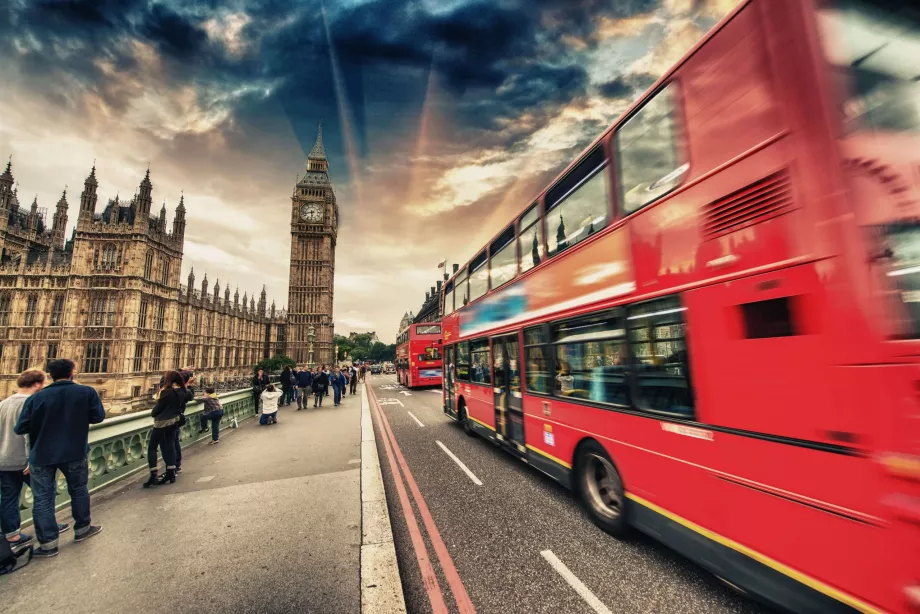Weather in United Kingdom and best time to go

The UK's temperate climate is influenced by the North Atlantic Current, which causes relatively mild winters. The weather in the British Isles can be described as relatively variable.
The UK is a relatively large country and the climate varies slightly from region to region.
Average summer temperatures range between 17°C and 21°C, dropping to an average of 5°C to 8°C in winter. Regular frosts and snow only occur in the north of Scotland during the winter.
Regions of Britain with different climates
The UK can be divided into several zones with slightly different climates and weather.
The west coast is characterised by high rainfall and winds from the Atlantic, while the east coast is drier.
- Central and northern England (major cities such as London, Liverpool, Manchester and Bristol) - has relatively even rainfall throughout the year and usually has variable weather, but there can be long periods of clear or partly clear skies or completely overcast skies.
- Scotland - the harsh climate of northern Britain is characterised by very rapid changes in weather, with sunny weather alternating with snowstorms or rain literally within minutes.
- Southern England (Cornwall, Brighton) - the climate here is milder and slightly warmer than the rest of Britain, and even in winter it can be above 10°C and sunny.
Myths about frequent rain and fog?
The UK is infamous for its constant rainy and foggy weather.
But is the reality really that when you arrive in London, your entire stay will be drenched?
The truth is that the weather can be very changeable at any time of year, but rain-free or even completely clear skies are statistically significantly more common in Britain than cloudy and rainy weather.
Fog is particularly prevalent in winter and especially in the early hours of the morning.
United Kingdom during the year
What is the weather like in the UK at different times of the year?
Weather in winter
The coldest months are December, January and February.
Winter weather is similar for the whole country from Scotland to Cornwall. Average temperatures range between 4°C and 8°C, and can rise to over 10°C in the very south.
In contrast, the Scottish mountains often have frost and light snow.
Precipitation is also heaviest during the winter, although it is not drastically higher than the rest of the year (only about 10 to 15 %). Rain is usually in the form of showers, but can last all day.
Winter weather is most prone to frequent morning fog.
Winter is ideal for visiting cities, galleries, museums and monuments.
Spring weather
Spring is marked by even more frequent weather changes than usual in winter or summer.
Rain showers alternate with clear weather several times during the day, and temperatures reach around 11°C to 16°C across the country.
The spring weather is great for walks in the towns and cities, but also for trips into the countryside if you have good waterproof clothing.
Summer weather
Normal summer temperatures in the southern half of the UK are between 20°C and 24°C and in Scotland around 16°C and 20°C.
Statistics show that England and Wales get the least rain of the year, but showers can still occur at any time.
In Scotland and Northern Ireland, rainfall totals are similar to the rest of the year, and it's a good idea to bring waterproof clothing even in summer.
Autumn weather
Autumn is notoriously cold, but temperatures are often pleasant, ranging from 8°C to 15°C.
Showers are more intense than in summer, but there is a good chance of good weather during autumn.
Table of temperatures during the year
England - The whole of England falls within a temperate oceanic climate
Scotland - The further north you are, the harsher the weather will be
When to go to United Kingdom
Unlike tropical destinations, there is apparently no season that is best suited to visiting the country.
In spring, you can admire the awakening of nature, in summer you can taste the British cool on one of the many beaches, in autumn, despite the chilly weather, the colourful fallen leaves enchant you as you stroll through the parks and in winter, the magical Christmas atmosphere is captivating thanks to the lit lights, subtly decorated trees and singing charity workers.
The UK is therefore a year-round destination.
However, if you're planning a trip to the countryside, focus on April to September when the weather is most likely to be good.
Any questions left?
If you have any questions or comments about the article...

